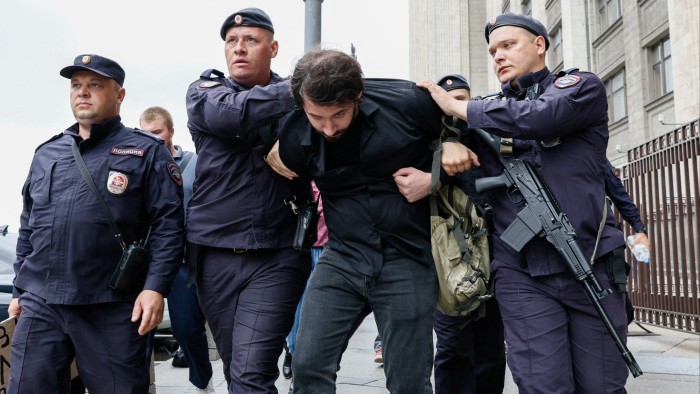Unlock the Editor’s Digest for free
Roula Khalaf, Editor of the FT, selects her favourite stories in this weekly newsletter.
The writer is a lawyer, co-founder of digital rights organisation RKS Global and CLO of VPN Guild
In July, Russian authorities passed laws ushering in a new era of digital repression. These laws punish the search for prohibited, “extremist” content and complicate the use of virtual private networks (VPN) that can create a secure, more private online connection.
Russia now has one of the lowest levels of internet freedom in the world, behind only Iran, Myanmar and China.
However it would be misleading to compare Russia to China. While China’s web was state-controlled from the start, Russia’s remained open for decades. People enjoyed fast, cheap access to global services.
It took over a decade for the Kremlin to take control of VK and Yandex, in effect nationalising the country’s tech giants. The government’s use of deep packet inspection (DPI) technology enabled website blocking and made censorship more effective, but until relatively recently, censorship was still easy to bypass with VPNs.
That changed in 2020, when Russia’s sovereign internet law came into force. It allowed centralised control of internet traffic, protocol restriction, and IP-level blocking — all without needing the assistance of telecom providers.
In the wake of Russia’s full-scale invasion of Ukraine, the Kremlin changed how it regulated the internet. According to internet rights monitor RosKomSvoboda, more than 25,000 websites have been blocked since 2022 due to military censorship.
Censorship has made circumvention tools such as VPNs even more popular. Today almost 40 per cent of internet users in the country use VPNs, one of the highest rates in the world.
Even after the authorities attempted to throttle YouTube last year (something they never acknowledged, instead ascribing access problems to the company’s outdated caching server infrastructure), it continues to be the most popular platform for viewing entertainment and political content. And views of opposition media, bloggers, and anti-war activists on the platform have not declined significantly.
This summer, a new wave of regulation began. According to experts, the law passed makes it in effect illegal to consume prohibited content. People can be fined not only for sharing information, but for looking for it. The law’s wording is unclear. “Extremism” can refer to a lot of different things. It could refer to the late opposition leader Alexei Navalny’s team, the LGBT+ community, Jehovah’s Witnesses — even Instagram.
The punishment is currently limited to small fines. But there are no doubts that in the next iteration of legislative amendments, which could happen next year, their size will increase and repeated violations will result in criminal liability. The new rules could also be used to put pressure on people in certain situations, at the border perhaps, or in police stations. If you don’t show your phone, the police might think you have something to hide.
Another possibility is that the government will automate the analysis of user traffic and start to issue vast numbers of fines to people. Authorities already have relevant experience on this. During the pandemic, people who broke self-isolation rules were fined automatically. Everything needed to put this into practice is already in place. Russia’s surveillance programme for monitoring telecommunications — the System for Operative Investigative Activities (SORM), the “Yarovaya law” (federal bills passed in 2016 to combat terrorism that mandate storage of messages and metadata), as well as AI systems that are able to analyse video in real time by keywords.
The best solution for Russian citizens trying to avoid punishment is to use a VPN with a kill switch feature that prevents leaks to telecom providers and SORM. And of course avoid using Russian services like Yandex and VK.
However, use of VPNs is growing more difficult. Adverts for the service are not allowed. And while VPNs for personal use are still permitted, individuals caught using it to post content deemed illegal, such as anti-war messages, are likely to be met with harsh punishments.
Russia’s new rules have already worried a lot of users, who have started to unsubscribe from banned channels and bloggers. The new law could accelerate digital migration to controlled Russian platforms like VK’s messenger service Max, which will ultimately give the Kremlin even more opportunities to carry out surveillance and censorship.
The measures show how quickly a country can move from an authoritarian model of cyber space regulation to a totalitarian one. Russia’s goal seems to be no longer just limiting what people say, but controlling how they access their information and communicate with one other.
